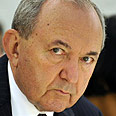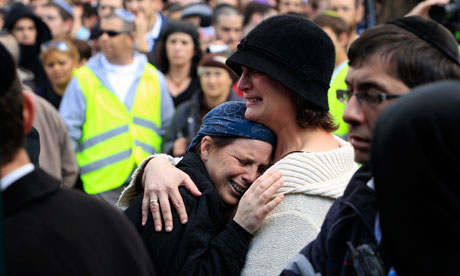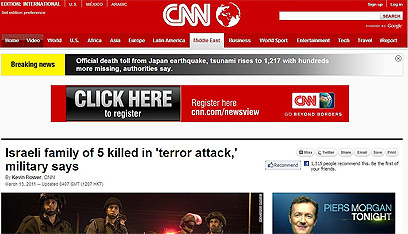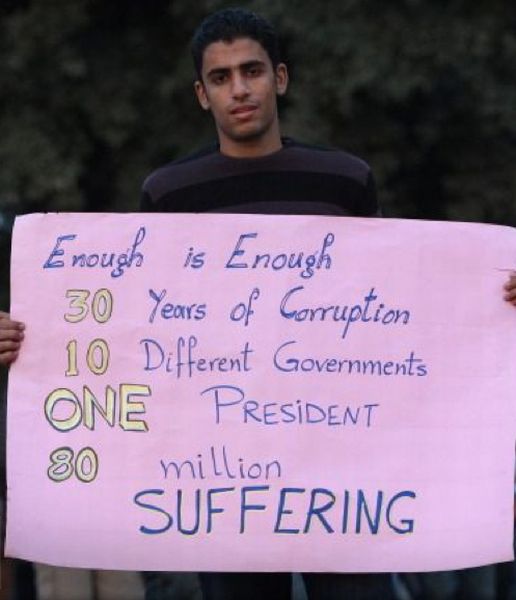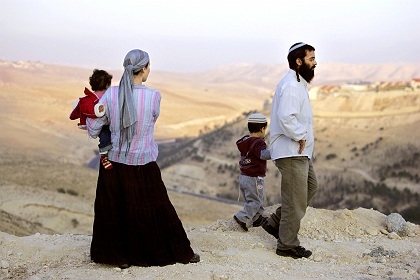An op-ed I wrote for The Jerusalem Post, which you can also read here:
The media's bias isn't something I like to pounce on often; even if I disagree with an article or headline, I accept its attempt at balance. And as a journalism student, I am constantly seeking objectivity in everything I read, with every newspaper article and news broadcast becoming an object of scrutinizing study and analysis.
I write this as the girl who struggled and succeeded to screen liberal films that expose the Palestinian side of the conflict in a university that is mostly uniform politically. I write this as a Jew who corresponds with Israeli Arab pen pals, as a daily reader of BBC, Haaretz, The New York Times, Al-Jazeera, The Guardian, and The Jerusalem Post, as a student activist who is organizing an apolitical demonstration in Times Square in support of peace in the Middle East:
The outburst that happened in response to a story that really isn't at all complicated -- five Jews stabbed to death in their home on Friday night by an Al-Aqsa terrorist-- has been used to very artfully condemn not the murder itself, but the settlements and Israeli policies. It has completely crossed the lines of moderation and balance.
Yet what shocks me more than the response from the media, and that of the international community, is the response I hear from fellow Jews here in America.
The morning after the attack, a friend of mine studying in an American university commented offhand to me that "the people killed were not killed for being Jews, but for being settlers, and that is not a Jewish question. It's a very important Israeli political question."
"Insofar as Jews died," she added, "It is very sad-- but it is as sad as when a family is killed by a car crash."
As for the political activity going on on Facebook, in regard to my friends posting outraged links and images to the latest updates on the attack, she said, "It wouldn't hurt your friends to have someone challenge their propaganda."
Her words continue to ring in my head, days later. I still find myself in shock, and even pain, over them. Killed for being settlers alone. As sad as if they were killed by a car crash.
There is a growing movement among left-wing thinking Jews to be absolutely paranoid of anything that smacks of conservatism. That includes, apparently, mourning the deaths of the Fogels-- precisely because
BBC and
CNN report the Itamar killings with quotations, we readers ourselves have begun to question our own emotional responses. Perhaps, one thinks, the 'intellectual', 'reasonable' and even fashionable way of responding is to simply, coolly, distantly, point to maps of settlements. To disregard the naked hatred in this act, and to call those who find the attack anti-Semitic, 'ethnocentric'. The logic is as follows: Those who feel emotionally affected by this must be supporters of the settlers, therefore politically conservative and possibly even religious, therefore irrational, and therefore racist.
Most political discussions for us college students take place not in the coffeeshops or salons of old, but rather via the world of social media, mostly Facebook and occasionally Twitter. The debates have grown heated, and within the Jewish student community, I'm finding that many of my friends are posting comments like, "There are people murdered all over the world. EVERY DAY. This is no different! Get a grip, people." They equate those who decry terrorists as animals, to Nazis' dehumanizing of Jews. Blanket statements are made, accusing other Jews of having waited 'for a Palestinian Arab to kill someone so they could justifiably rant against "hate-filled Arabs who train their children to kill Jews"'.

The fact that parallels are being drawn between this killing and the happenstance of a car crash, or that this is seemingly justified by the 'settler' label, or the fact that there are genocides going on in Darfur and therefore this is insignificant, underlies a disturbingly shifting view amongst Jews (both American and Israeli) towards Israel and towards each other. I am forced to wonder about the future of the State and of Diaspora Jewry: where are the young idealists and dreamers of 1948? It's overwhelmingly discouraging to see such cynicism, self-bashing, and inner fighting often just for the sake of fighting, especially after such bloodshed.
So in a time in which Jews jump to condemn other Jews of racism, ethnocentrism, and fanaticism, let us remember this:
Five Jews or peaceful civilians or settlers or family members or West Bank residents or Judea and Samaria citizens or breathing feeling thinking laughing crying human beings were just murdered by an Al-Aqsa Palestinian terrorist in the deceptive peace of the Sabbath night.
To the Jews who use such an event to immediately accuse other Jews of racism (the irony: it takes a hate act done by a Palestinian against Israelis to spawn condemnation of Israeli racism):
I wonder at your chutzpa to dare to taint the pure memory of five innocent human beings with absolutely any prejudices, whether against Jew or Muslim, during such a difficult national tragedy.
And to the world which uses this act of terror to denounce the Jewish reaction as impetuous and exaggerated:
Know that, despite everything, we refuse to be overtaken by anger and we refuse to hate. Maimonides writes that anger is the worst trait a person could have: 'So too is anger an exceedingly bad quality; one from which it is proper that one distance himself to an extreme. A person should train himself not to anger even on a matter regarding which anger is appropriate.' The Israeli government as well as the surviving Fogel family have condemned those who take personal revenge and take the law into their own hands. As Prime Minister Netanyahu said, "The law that is taken into one's own hands is no longer law"-- never should a person react upon emotion, upon angry impulse and without rational thought, no matter what his personal reasons.
Yet sadness? Mourning? That is entirely appropriate, essential even; those who mock it or shrug it off as political radicalism do so callously. In Judaism, the process of loss is crucial to individual as well as collective growth: Jewish tradition enumerates the detailed laws of shiva and shloshim and the year of mourning after a family member passes away. We are commanded to remember, to never forget and to learn from those who have passed on.
And so, dear world, let us mourn our dead in peace-- for to deny respect and validity to emotions in a time like this is to deny the very stuff that makes us human.
~turkish caffe latte ~







